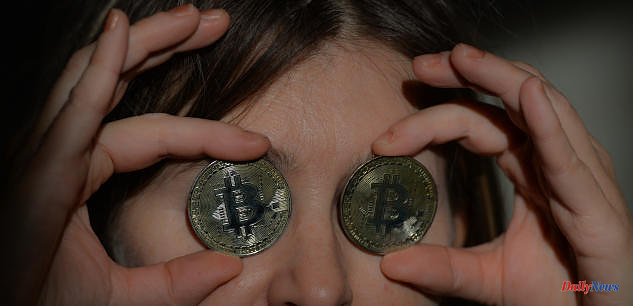Wael, 20 years old, is half-joking and half-crazy. "Last week my loss was more 800 euros. Now I don't dare look anymore ...",," he said. He invested last year in UOS cryptocurrency, which was created by Ultra and supported by Ubisoft. The delivery man from Paris is not ashamed to admit that he was looking for profit and hoping to make easy money, but with a certain amount. He did not put in all his savings. He only had a $1200 nest egg with the intention of "getting on to the crypto bandwagon before its gone." He has since lost the majority of his stake in cryptoassets. This is similar to many other investors. Bitcoin peaked at $69,000 last November. It is now worth less than $20,000 The queen of cryptocurrency has a freefall of -70% The correction is more severe for thousands other cryptos, many of which have been shut down. Capitalization for the entire cryptomarket was then divided by three: from $3 trillion in November, to $877 billion now. A crypto crash. Benjamin Dean, Head of Cryptoassets at WisdomTree, stated that we have entered a 'crypto winter,' which is a period of sustained decline in valuations.
This is a brutal return to reality. The rise in bitcoin's value driven by self-interested investors has led to a kind of absolute faith in cryptography. It is as if it were the solution to all financial problems. The Technology Stock Exchange collapsed twice as fast than the Nasdaq and has questioned beliefs and certainties. Marc Touati (president of ACDEFI cabinet), believes that the mass is:
However, this did not diminish the doubts among those who invest their money in computer code. Clement Vannier (23), a recent graduate, recorded a correction of "between 5,000 to 6,000 euros" for his investments in Ethereum and bitcoin. This crypto expert puts it in perspective, saying "You shouldn’t panic." These technologies were something I believed strongly in, and still do. It is a volatile and unstable environment. As long as we don't sell, it's not lost. Arthur, 19, a 19-year-old graphic designer student in Allier, has the same sense of nuance.
However, there are a few smaller carriers that are less overwhelmed. Daniel, a young Englishman who shared his disappointment on YouTube, said: "Everyone predicted that bitcoin would easily surpass 100,000 dollars so even buying it for 50,000, I was confident. Today, it's half the amount that I invested in bitcoins. I am sorry that I believed everyone who claimed it was easy to make a millionaire using cryptos.
The discomfiture among cryptomillionaires is staggering. Bloomberg estimated that the sector's seven richest people saw their wealth rise to $114 billion. The whole sector has been shaken up in recent years, especially with the advent of cryptocurrencies. These "non-fungible tokens", or NFTs, are used to sell virtual objects. They can be anything from digital works to clothing. This is a popular choice for crypto-billionaires looking to get recognized. According to Statista, new NFTs sold for 153 millions dollars in September 2021 and were resold for 691 million. Mid-June saw new listings drop to $7.5million and resales fall to $26million. This is a drop of -95%! This slump is embodied in Sina Estavi, the boss of Bridge Oracle, a crypto company. She bought the NFT of Jack Dorsey's very first tweet for $2.9 million in March 2021. The new-fangled art collector tried to make a capital gain by putting it up again for auction last April with a starting bid of 48 million. The best offer he received for six months was... 61.28 USD. The plucked person tells CoinDesk that he may never sell it.
Arthur, a student from Allier, analyses: "The world is full of cryptos. You believe you are all-powerful when you win. When you lose, you feel like it isn't your fault and you will get better. These psychological mechanics are very close to the game. The fall of virtual assets can have very real consequences. Particularly in corporate finance. The sector's start-ups, which often make their money through cryptocurrency transactions, are in terrible shape. The Gemini company, owned by the twins Winklevoss, announced it was going to lay off approximately 100 employees. Crypto.com was also laying off 260 employees. BlockFi was also cutting 170 employees. Bybit was also reducing its workforce 20-30% while Three Arrows Capital, a Singaporean investment fund, is liquidating. Coinbase, a giant in the cryptocurrency industry, has announced the layoff of 1,100 employees. The Binance platform is the only one that continues to invest, even though the sector is tightening its belt. Changpeng Zhao, Changpeng Zhao's boss, assured "Echos" that they are "prepared for any worst-case scenario, even though bitcoin prices fall to zero".
Not all societies can afford to anticipate. Particularly those who have also placed their money on bitcoin. First, Tesla, the maker of electric cars, whose boss Elon Musk frequently promotes cryptocurrency on Twitter. The electric car manufacturer bought $1.5 billion worth bitcoins in early 2021. These bitcoins are now worth $907 million. Block, Jack Dorsey’s payments company, is another bettor. His portfolio has grown from $3.5 Billion at March 2021 to $1.7 Billion a year later.
MicroStrategy is an American software publisher. It has seen its net income decrease with a loss 170 million dollars for the first quarter 2022. Indeed, the company converted its cash into Bitcoins and is now able to borrow money to purchase more. For 129,218 bitcoins, which are now worth... 2.6 million, 3.7 billion was spent. Phong Le, president at MicroStrategy, maintains that "We have a long term strategy and have no plans of selling them." Uncertain if all employees believe the same thing: "We are offered retirement plans in bitcoins when things are going the worse... It's a funny idea," criticizes one.
El Salvadorans find it even more difficult to swallow the pill. With a double aim, the country made bitcoin its official currency under the leadership of Nayib Bukele, its young president. First, we want to free ourselves from the American Dollar, which replaced our local currency twenty-years ago. Second, we want to reduce bank commissions on money transfers made by Salvadorans living abroad (funds that account for almost a quarter GDP). It was then about making Central America a safe haven for crypto investors. A "Bitcoin City" is being planned for the coast near the Conchagua volcano. It will use geothermal energy to provide power to "miners", who are responsible for the block cryptography, the basis of cryptocurrencies. Bukele decided to convert $105 million of the country’s monetary reserves into bitcoins. This amount has lost more than half its value, to $48 millions. This is not to mention the fact that $425 million was spent on legal tender for this entire implementation. Bukele, however, continues to believe it. He stated on Twitter:
Except that his economic gamble raises serious questions. JPMorgan Bank (IMF) and the International Monetary Fund have warned El Salvador that it is on an "unsustainable path" with large financing needs and skyrocketing debt. The Fitch Ratings agency has downgraded El Salvador's rating. Meanwhile, the level of insurance contracts that cover defaults in payments has increased by more than 30%. The IMF advised that the authorities should "resist using bitcoin" due to the risks to consumer protection and financial stability of the country. It is especially important because few Salvadorans use it. A report by the National Bureau of Economic Research showed that only one fifth of companies accept it and that only 5% of businesses regularly use it. The majority of cryptocurrency users are men, young, educated, and have bank accounts - even the richest.
Some will argue that El Salvador isn't the only country to make this bet. The Central African Republic (CAR), at the end April, also decided to adopt bitcoin legal tender. This is a strange decision for a country that is in the middle of civil war and where one in ten people has internet access and one in six have electricity. The ambition here is not financial. It's to use the absence of regulations to "pay Wagner", this Russian mercenary group that officiates in the country. Their assets were frozen in December following the outbreak of war in Ukraine. "Bitcoin wasn't for the people. They have nothing and are suffering the consequences of underinvestment in infrastructure. It's just a way to make money with the Russians.
Beyond all the fun, the crucial question is: Will this "winter", or the end of cryptocurrency? Craig Erlam is an analyst at Oanda Investment Platform. He believes that the cryptocurrency market has not completely crashed, but warns that it will all depend on the mindset of people who have currencies and whether they are tempted to give them up. According to the Oanda analyst, all "holders", i.e. The market could crash if all the "holders" (i.e., those who hold crypto) decide to stop paying fees and sell. This is a state of mind that some investors, such as Daniel from England, are already experiencing.
Indeed, the student points out a major disappointment. Bitcoin was seen as a safe haven during generalized price rises due to its rarity (the number of bitcoins is very small). Some analysts are stunned to learn that cryptocurrency hasn't played the role of digital gold. Karl Toussaint du Wast founder of Netinvestment and Formacrypto platforms, said: "Economic logic dictates investors should turn to rare assets in the event high inflation." It wasn't the case with bitcoin or gold. We don't know why. There is a market for investors who are looking for bargains and waiting for the market bottom to purchase back at the highest price.
Jean-Paul Delahaye is a professor emeritus in computer science and author of "Beyond Bitcoin" (to be published by Dunod in August). His analysis is even more critical: "Cryptos can only be speculative objects. They will never have the stability of gold. Gold is a well-known commodity, and can be used to make jewelry. It also has a relatively constant cost of extraction due to labor. Bitcoin's production cost varies greatly depending on how many miners are mobilized. It doubles every four years. The bitcoin system stipulates that "miners", who are responsible for maintaining the blockchain, receive half the remuneration for each 210,000 bitcoins produced. This is approximately every four years. Bitcoin will never be a stronghold against inflation.
The crypto-crash allowed for a moderate return of reason. It has at least reminded us that cryptocurrencies are fragile. However, analysts interviewed do not believe that cryptocurrencies will ever reach their destination. Jean-Paul Delahaye insists that blockchain technology is a valuable tool for transferring value quickly, even though it has its flaws, particularly on the environmental side. We aren't done with cryptocurrency! Wael, the tiny feathered holder of cryptocurrencies, is a believer. "It hurts but I think it'll go up. It's a solid venture, and I hope investors will return.












